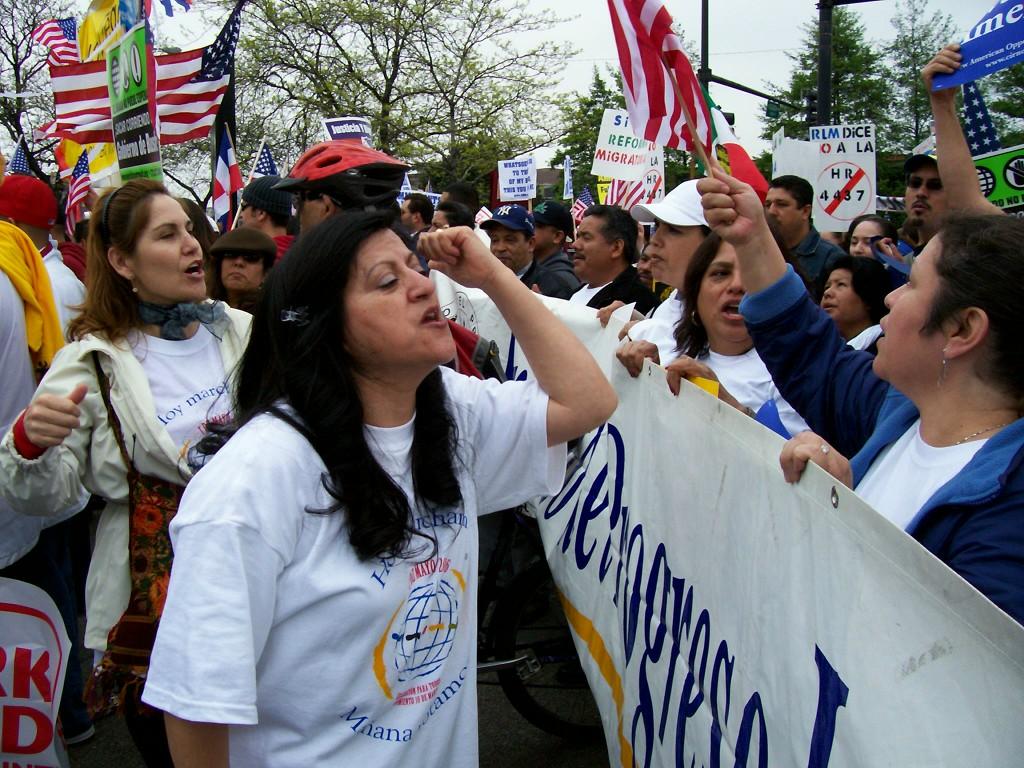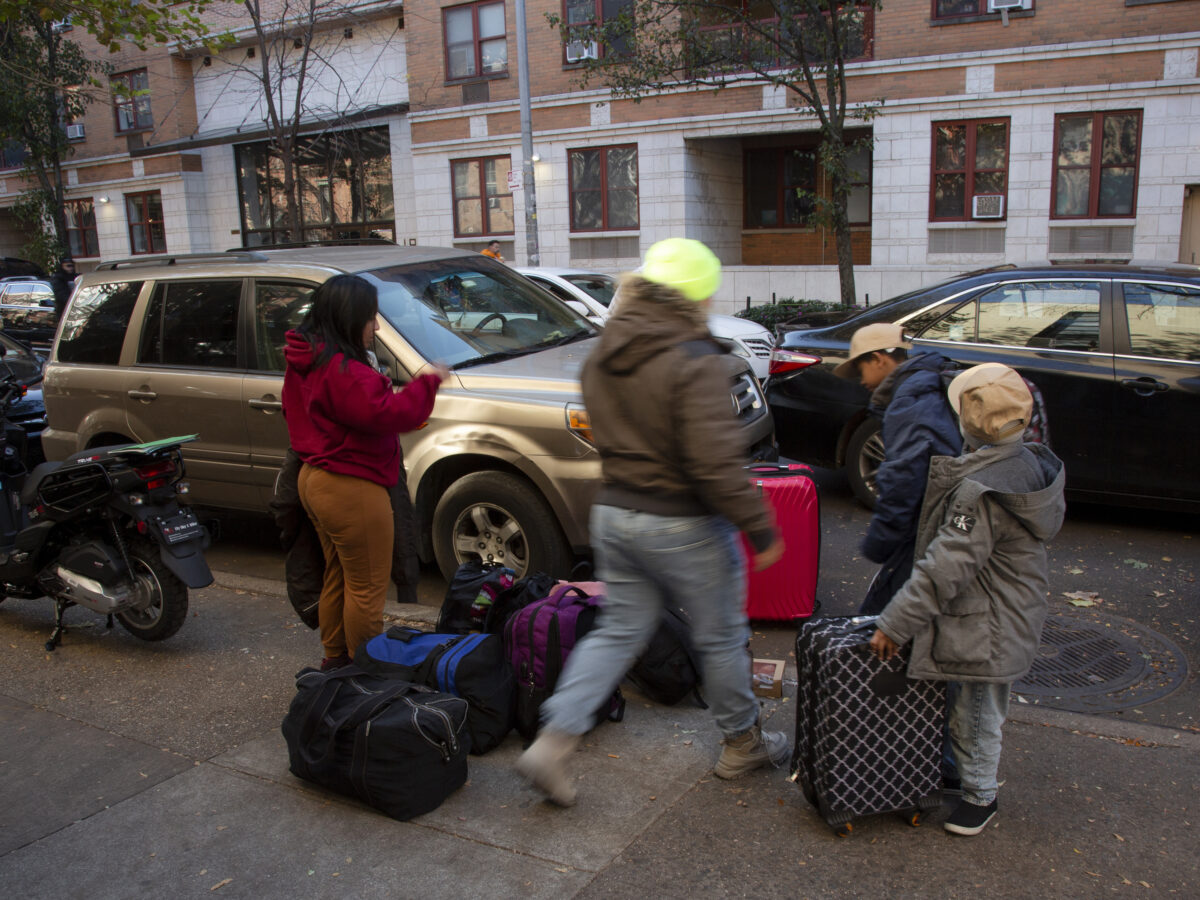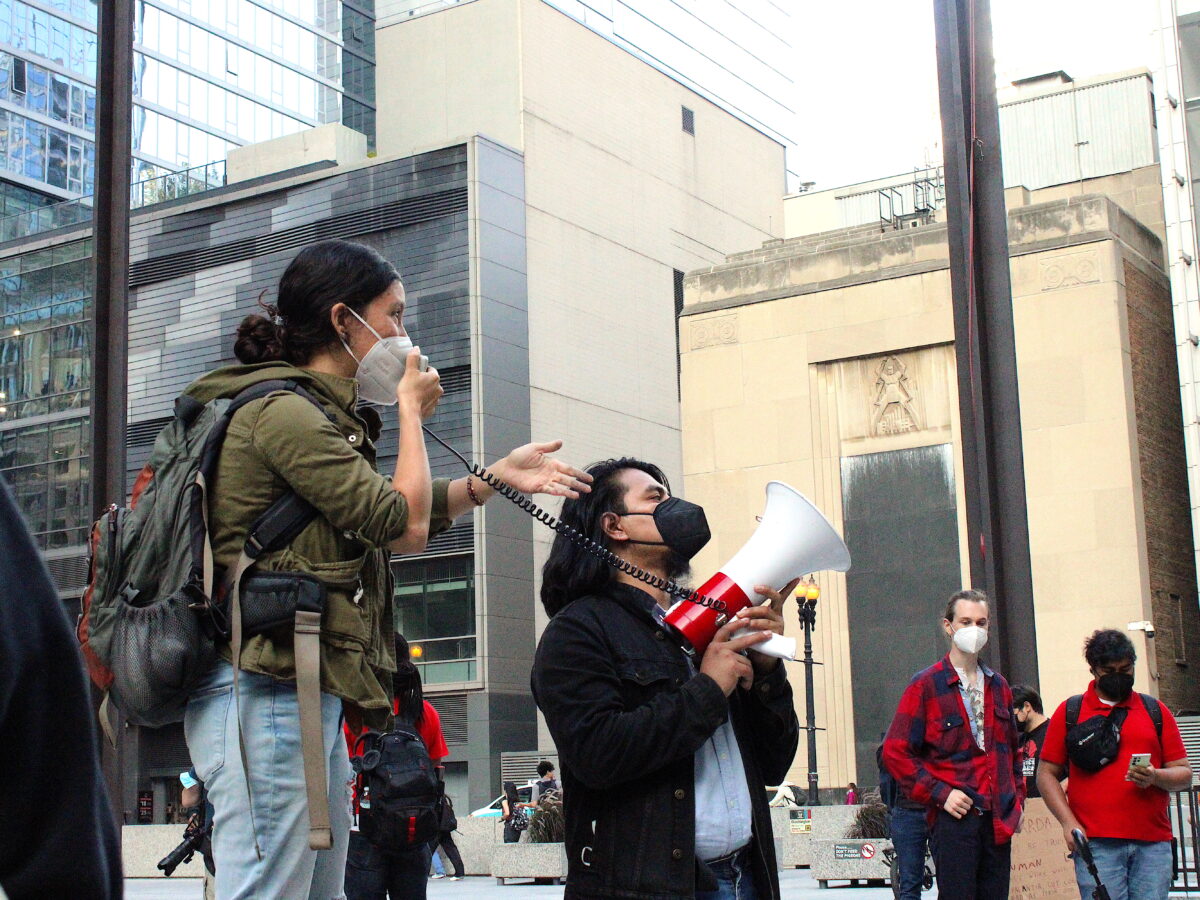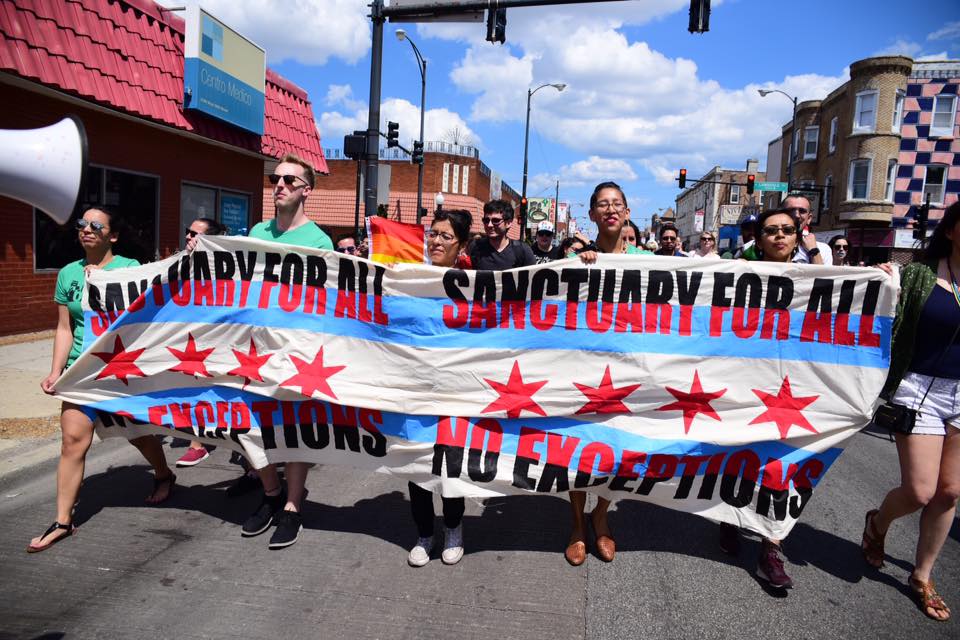On March 10, 2006, an estimated 100,000 people—mostly of Mexican descent, but also Middle Eastern, African, Asian, and Eastern European immigrants and their children and grandchildren—took to the streets of downtown Chicago in one of the largest immigration marches in U.S. history.
People protested proposed legislation which would make unlawful entrance into the country a felony, and jeopardize the security and safety of the eleven million undocumented immigrants living in the country. The proposed legislation was known as the Sensenbrenner Bill, sponsored by Republican Rep. Jim Sensenbrenner from Wisconsin.
Various Chicago groups and organizations banded together to organize the march. More followed in cities across the U.S. on May 1, 2006, inspired by Chicago’s demonstration, in a day of actions that collectively became known as “La Gran Marcha” (“The Great March”) and “El Día sin Inmigrantes” (“A Day Without Immigrants”). Those demonstrations brought between 1.6 and 2.2 million people together across the U.S. in a remarkable display of unity and power.
Rafael Pulido, a then-local radio broadcaster from WOJO, Que Buena 105.1 FM station known as “El Pistolero”, played a key role in igniting the flame of the first Chicago demonstration by reaching thousands of immigrant listeners.
“I read about the proposed law that came out in the Chicago Tribune,” he said. “I was on the radio during that time. I thought it was very impactful—what was about to happen because the proposed bill automatically criminalized every unauthorized person.”
When Pulido began hearing more about the anti-immigration bill, he asked various organizations and legal experts for information to give listeners a well-rounded, reputable understanding of the bill’s trajectory. Pulido’s morning program turned into an open forum for Chicago’s Latinx immigrants to express their views. Pulido and other hosts also invited legal experts and activists to the show.
“So, apart from telling people to go out and march, we also informed people about what else they could do,” he said. “Who were their state representatives in their districts, that they could call, and what was their stance on the issue?”
Pulido immigrated to the U.S. in 1980 at the age of nine with his recently widowed mother and five other siblings. “It became important to me because I am an immigrant,” he said. “I learned from a very young age that an immigrant is that person that has to give up their country of origin because that country was not able to provide the basic necessities to survive.”
But before the 2006 Chicago demonstration, Pulido banded with Centro Sin Fronteras, to call attention to the Sensenbrenner Bill in a July 2005 march in the Back of the Yards neighborhood. Pulido learned a lot about how to organize protests effectively from that march.
Not everyone ended up making it to the meeting place, a stage at the Swap O’Rama, to rally. He said folks were diverted, and had to walk under a bridge because street permits only allowed people to walk on the sidewalks.
Despite that, and even though the initial march hardly got any media coverage, Pulido said it surprised a lot of people and ultimately sparked the mega-march of 2006. “We thought, if we organize ourselves better next time, this can become bigger.”
He had thought they’d get between 18,000 to 20,000 people, but said the march exceeded his expectations.
The scale and success of the 2006 march became so well known that radio DJs in other cities, such as L.A., reached out to him for advice so that they could also inform their local listeners who wanted to march in different cities.
Xanat Sobrevilla was attending the University of Illinois Urbana-Champaign during the height of the 2006 marches, but her mother and sister were able to attend the March 11 demonstration in Chicago.
She and her family came to the U.S. in 1996 when she was nine years old. She said that being undocumented wasn’t something her family hid. “But it wasn’t anything that we spoke about to just everybody.”
Sobrevilla was able to afford her studies by working, taking scholarships, and with her parents’ savings. After college, Sobrevilla became involved in immigrant rights, specifically with the “Coming out of the Shadows” campaign in Chicago.
The campaign, made up of mostly undocumented college students, motivated other undocumented people to voice in public their stories and struggles, such as not being able to apply for authorized work, not being able to get a driver’s license, and not being able to qualify for financial aid for college—all things that Sobrevilla was personally dealing with.
“We saw sharing our stories…as contributions to the movement,” Sobrevilla said. “We knew they were important as a tactic of visibility not only for those unfamiliar with the situation, but it was also the way other undocumented people would find community.”
Sobrevilla had first heard about the Coming Out campaign in the news, and in 2012, she joined college students at the University of Illinois Chicago (UIC), where her sister attended, and where other college students had been organizing demonstrations.
She eventually started working for one such organization, the Immigrant Youth Justice League (IYJL).
“It was difficult for me to share not so much my status, but the ways it had impacted my life,” she said. “I remember the process of preparing for that moment. The hardest thing was being vulnerable when for so long, we had tried to disguise our status. I think what we’re told is to assimilate and just put our head down. And this is just the way it’s gonna be. And it’s so demoralizing. And so a lot of harm is allowed to happen.”
Sobrevilla’s work with the Immigrant Youth Justice League and “Coming out of the Shadows” evolved into Organized Communities Against Deportation (OCAD), an organization that works to stop deportations of immigrants who find themselves in removal proceedings.
Sobrevilla said solidarity amongst various groups is key in pushing for immigrant rights and finding the connections that unite other groups. She said it’s important to see the similarities between immigration removal proceedings and the criminalization of Black and brown people by Chicago police.
“I think all of this has led to increased networks of support, and the ability to be there for each other,” she said, “And dream of a place where Black and brown people can be better.”
She thinks this unity is especially important now amid efforts to threaten Chicago’s status as a sanctuary city upon the arrival of nearly 21,000 migrants.
Pulido said he is disappointed because institutions and individuals are using the issue of immigration to make a profit. “Guilty is not the refugee who is here today,” he said. “Guilty is the system, guilty is the government, guilty are the politicians who have made the need for legalization part of their political agenda, because the undocumented [person] generates votes in favor, generates anti-immigrant laws, generates money from imprisoning people—the detention centers.”
Pulido also noted the importance of solidarity, and recalled the sense of unity amongst groups during the marches in which he participated.
“It was like a different unity that you don’t see much,” he said. “It was not only Mexican immigrants but also from other countries: Africans, Chinese, Poles, everything, and more workers.”
Sobrevilla and Pulido, while part of different time periods within the immigrant rights movement, share the belief that people should have the ability to migrate freely.
Sobrevilla said she wants to continue to push the idea that borders can become obsolete. “In the sense that humans truly can practice the right to stay and move and be safe,” she said. “I think it’s just keeping that vision, that goal, in sight.”
“It’s a necessity of a human being that has been going on for thousands of years,” Pulido said. “What part of history says that people haven’t had to migrate to other parts out of necessity? Only that nowadays, it has been made into a political strategy to benefit from.”
Alma Campos is a senior editor for the Weekly.




